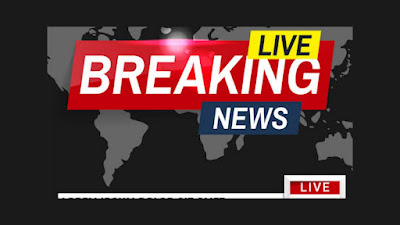- Published
A Russian journalist who burst on to a live TV news programme to protest against the war in Ukraine has been reported missing overnight.
Marina Ovsyannikova, an editor at state-controlled Channel 1, was detained after she ran on to the set on Monday holding an anti-war sign.
The sign, clearly visible for a few seconds, read: "No war, stop the war, don't believe the propaganda, they are lying to you here."
Her whereabouts are now unknown.
Ms Ovsyannikova's lawyers say they have been searching for their client but have been unable to find her.
One of them, Anastasia Kostanova, told BBC Russian she had been trying to reach Ms Ovsyannikova by phone but her calls had gone unanswered.
Ms Kostanova said she "spent the whole night looking" for the missing journalist.
"This means that they are hiding her from her lawyers and trying to deprive her of legal assistance and, apparently, they are trying to prepare the most stringent prosecution," Ms Kostanova said.
Another lawyer, Pavel Chikov, posted on Twitter that he was unable find Ms Ovsyannikova.
"Marina Ovsyannikova has not yet been found. She has been imprisoned for more than 12 hours," he said on Tuesday morning.
Police arrested her over a new law that bans calling Russia's military action in Ukraine an "invasion" or spreading "fake news" about the conflict.
Though the strictest punishments carry a potential prison sentence of up to 15 years, Mr Chikov said Ms Ovsyannikova was likely to be fined 30,000 to 60,000 roubles (£205-£410).
'Don't be afraid'
During the protest, which happened live on Russia's main nightly news programme, Ms Ovsyannikova said, "No to war! Stop the war!" before the programme director cut early to a recorded news report.
Before the incident she recorded a video in which she called events in Ukraine a "crime" and said she was ashamed to work for what she called Kremlin propaganda.
"I'm ashamed that I allowed myself to tell lies from the television screen. Ashamed that I allowed Russians to be turned into zombies," she explained. "We just silently watched this inhumane regime."
Ms Ovsyannikova, who said her father was Ukrainian, called on the Russian people to protest against the war, saying that only they could "stop the madness".
"Don't be afraid of anything, they can't imprison all of us," she said.
From the moment Ms Ovsyannikova's identity became known, she has received dozens of comments on her Facebook page in Ukrainian, Russian and English, thanking her for her actions.
Ukraine's President Zelensky also praised her for "telling the truth".
But Kremlin spokesman Dmitry Peskov called her actions an act of hooliganism.
Russian television news has long been controlled by the Kremlin and independent viewpoints are rare on all the major channels.
State-controlled Russian media refer to the war as a "special military operation" and paint Ukraine as the aggressor, describing Ukraine's elected government as neo-Nazis.
Several of the remaining independent media outlets in Russia have stopped broadcasting or publishing after pressure from the authorities, including the radio station Echo of Moscow, and TV Rain - an online TV channel.
Others, like newspaper Novaya Gazeta, are attempting to report on the situation without falling foul of the new censorship laws.
War in Ukraine: More coverage
Access to the BBC has also been restricted inside Russia, leading the corporation to issue guidance over how to continue using its services.
Russia's media watchdog accused the BBC and other foreign broadcasters of the "deliberate and systematic circulation of materials containing false information".
Many social media sites have also been blocked, further restricting the number and diversity of news sources available to people inside Russia.
Facebook and Twitter have been restricted for several days, while Instagram - which is particularly popular in Russia - was blocked on Monday, although many Russians have found ways round the restrictions.
Journalist's fake account exposed
By Hamzah Abbas, BBC News
A Twitter account that many believed to belong to Ms Ovsyannikova has now been deleted, after it was confirmed to be fake.
The unverified account, which was created this month, quickly gained over 11,000 followers after posting a tweet on Tuesday reading: "I don't know what will happen to me any time soon. My lawyer told me I might be facing time in jail from five to 10 years according to the criminal code. I don't regret it. I need your endorsement though."
But as recently as yesterday, the account was going by the Twitter handle "@JuanArrendondo_" - a misspelling of the name of a US photojournalist who was injured in Kyiv, suggesting the user has gone through various Twitter handles.
The BBC understands that Ms Ovsyannikova is currently in police custody, where it is unlikely she would have access to social media.
-
- 2 March
-
- 5 days ago
-
- 2 days ago
-
- 1 day ago


comment 0 Comments
more_vert